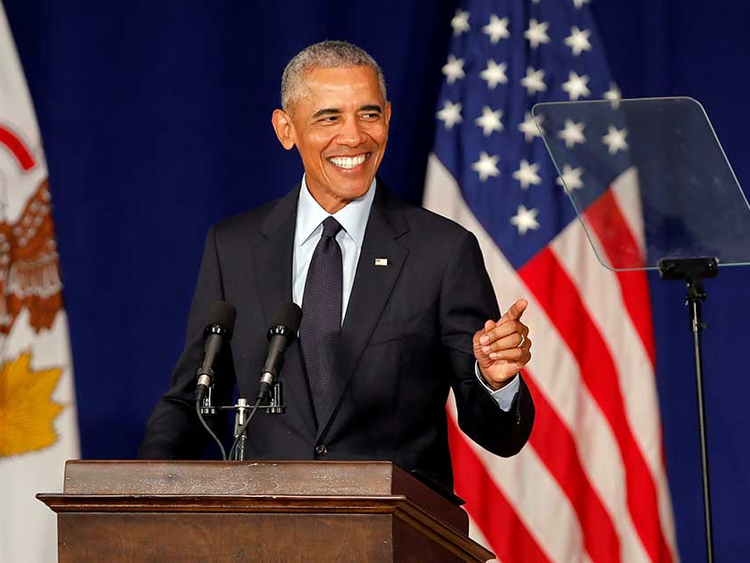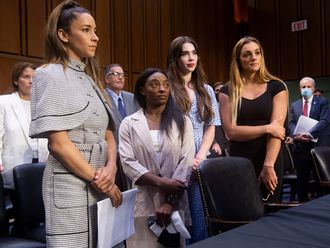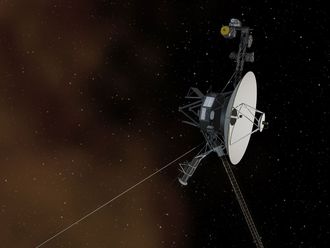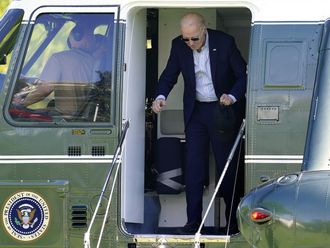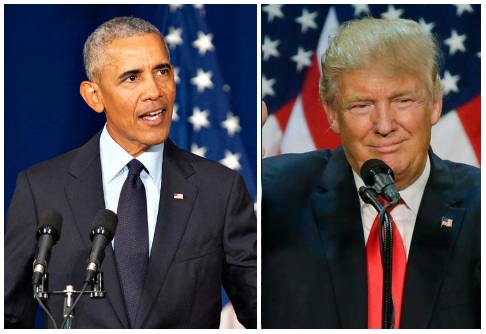
URBANA, Illinois: Former president Barack Obama re-entered the national political debate on Friday with a harsh indictment of President Donald Trump, assailing his successor as a “threat to our democracy” and a demagogue practicing the “politics of fear and resentment.”
In a dramatic break from the normal deference former presidents usually show to incumbents, Obama ended a long period of public reticence with a lacerating assessment of Trump.
Sometimes by name, sometimes by inference, he accused him of cosying up to Russia, emboldening white supremacists and politicising the nation.
“None of this is conservative,” Obama told an auditorium of students at the University of Illinois at Urbana-Champaign.
“I don’t mean to pretend I’m channelling Abraham Lincoln now, but that’s not what he had in mind, I think, when he helped form the Republican Party. It’s not conservative. It sure isn’t normal. It’s radical.
- Barack Obama | Former US President
"It’s a vision that says the protection of our power and those who back us is all that matters even when it hurts the country.”
Trump hits back
Trump wasted no time in responding.
Speaking to supporters at a fundraiser in Fargo, North Dakota, he dismissed Obama’s speech. “I’m sorry, I watched it, but I fell asleep,” he said.
“I found he’s very good, very good for sleeping.” At a later stop in Sioux Falls, South Dakota, he said Obama’s re-emergence would motivate his base.
“Now if that doesn’t get you out to vote for the midterms, nothing will,” he said.
Obama had always said he intended to follow the example set by former president George W. Bush, who after leaving office largely kept out of the public eye and refrained from criticising his successor.
- US President Donald Trump | Reacting to Obama's speech
But Obama has come under enormous pressure from Democrats frustrated that he has been absent from the stage as Trump dismantled his legacy and shattered norms that governed presidents of both parties.
Obama has weighed in from time to time, mainly through written statements criticising the reversal of his policies, and he made a few campaign appearances during off-year elections in 2017 taking issue with the president.
He also gave a eulogy last weekend for Senator John McCain that was widely seen as a rebuke of Trump.
But until now, he generally avoided using Trump’s name or challenging him in such a direct way.
'Trump is a symptom, not the cause'
“It did not start with Donald Trump,” he told the college students on Friday. “He is a symptom, not the cause.
"He’s just capitalising on resentments that politicians have been fanning for years, a fear and anger that’s rooted in our past, but it’s also born out of the enormous upheavals that have taken place in your brief lifetimes.”
The speech was meant to kick off a two-month campaign blitz to help Democrats take control of Congress in the November midterm elections.
His first public event will take place this weekend in Orange County, a traditionally conservative-leaning part of California where Democrats are hoping to pick up several House seats.
He is also expected to campaign next Thursday in Cleveland for Richard Cordray, a former bank regulator in his administration who is the Democratic nominee for Ohio governor.
Other former presidents have returned to the campaign trail after leaving office, especially Bill Clinton, while generally, though not always, avoiding direct criticism of their successors.
Vacuum of leadership
That Obama has stepped in to confront Trump underscores the vacuum of leadership and coherent message at the top of the Democratic Party, whose titular chiefs are in their 70s and whose next-generation figures have yet to establish themselves as commanding or unifying presences.
And his return may play into the hands of Trump by giving him the public foil he wants.
“I understand the idea that Democrats want to get the former president on the campaign trail as much as possible,” said Jim Manley, a longtime Senate Democratic aide, “but I’m not so sure that makes sense strategically because Trump would love nothing more than to use Obama as a punching bag.”
The more President @BarackObama speaks about the ‘good ole years’ of his presidency, the more likely President @realDonaldTrump is to get re-elected.
— Lindsey Graham (@LindseyGrahamSC) September 7, 2018
In fact, the best explanation of President Trump’s victory are the “results” of the Obama Presidency!
And neither would Trump allies like Senator Lindsey Graham, R-South Carolina “The more President @BarackObama speaks about the ‘good ole years’ of his presidency, the more likely President @realDonaldTrump is to get re-elected,” Graham wrote on Twitter.
“In fact, the best explanation of President Trump’s victory are the ‘results’ of the Obama Presidency!”
But Mo Elleithee, a longtime Democratic strategist who is now executive director of the Georgetown Institute of Politics and Public Service, said Obama seemed to be providing a message for Democrats to retake the mantle of populism by arguing that Trump’s version has actually elevated the interests of the wealthy and powerful.
“He filled a leadership vacuum for the opposition party,” Elleithee said after the speech, “but what I thought was more interesting is he started to draw a road map for Democrats who are looking for a different way of engaging this populist era and bring us back to a more hopeful approach.”
Obama acknowledged Friday that he had stayed out of the debate for the most part, jokingly blaming it on family concerns. “The truth is, after eight years in the White House, I needed to spend some time one-on-one with Michelle if I wanted to stay married,” he said.
But he said he decided to speak out now because “the stakes really are higher” than before. “Because in the end, the threat to our democracy doesn’t just come from Donald Trump or the current batch of Republicans in Congress or the Koch brothers and their lobbyists, or too much compromise from Democrats, or Russian hacking,” he said. “The biggest threat to our democracy is indifference.”
Obama criticised the president’s policies on climate change, taxes, health care and regulations, but saved his most biting comments for how he said Trump has warped the institutions of American life.
“It should not be Democratic or Republican. It should not be a partisan issue to say that we do not pressure the attorney general or the FBI to use the criminal justice system as a cudgel to punish our political opponents,” he said. “Or to explicitly call on the attorney general to protect members of our own party from prosecution because an election happens to be coming up. I’m not making that up. That’s not hypothetical.”
He also accused Trump of playing to bigots. “We’re supposed to stand up to discrimination,” he said. “And we’re sure as heck supposed to stand up clearly and unequivocally to Nazi sympathizers. How hard can that be, saying that Nazis are bad?”


